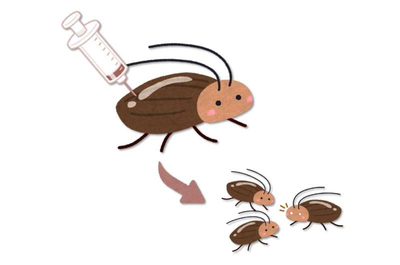Cockroach editing, monkeypox closes in, shark antibodies vs. Covid, and more
24 May 2022
Posted by Andrew Kantor
Paxlovid: What you need to know
As awesome as Paxlovid (aka nirmatrelvir/ritonavir) is for keeping Covid at bay, it does have some interactions that you need to watch for. (And that could be a reason some prescribers shy away from it — they don’t know about all these “drugs” and “medicines” the way you do.)
For example, people taking ergot drugs for migraine can’t take Paxlovid. Colchicine is also a no-no. Quetiapine? Be careful. Viagra for fun times? Probably OK. Viagra for pulmonary hypertension, though, is a different matter.
For all the details, the Infectious Diseases Society of America has a handy chart with recommendations, dosages, and lots of arrows.
ICYMI
Monkeypox is in Florida. That is all.
Come on down!
What do you get when you cross a Mafia* hit list with a Bingo tournament? Draw Down! — the fun, fast-paced event being held only at the Georgia Pharmacy Convention.
You buy a number. Or two. Or 10. Then you hope your number’s never up. The numbers are called, the players are culled, and you cross your fingers to be the last one standing (because you get to go home with a wad of cash … and a bunch of new friends).
The proceeds benefit the Georgia Pharmacy Foundation … except the aforementioned wad, which benefits the winner.
Draw Down! is held twice at the convention in the Expo hall, so don’t miss it — buy your tickets on site, then listen for the screams (of excitement) to join in the fun.
What, you thought it was over?
No one told the virus, I guess. New Covid-19 cases are up 42% nationwide from two weeks ago, with more than 100,000 reported for the first time since February. Hospitalizations are up, too. Georgia’s latest report showed 10,795 cases — the first time since February the state topped 10,000 cases.
Deaths are down, but they lag hospitalizations by a couple of weeks, so check back in early June….
Latest (potential) Covid treatments
Shark antibodies
Antibodies derived from sharks — specifically the rather cute bamboo shark — might help protect from, or treat, SARS-CoV-2 infection.
Antibodies from alpacas and llllamas are already being tested because they’re tiny. They’re nanobodies. Related to those are vnarbodies*, which are even smaller and come from cartilaginous fish, e.g., sharks.
Both of these types of single-domain antibodies show superiority to other types of antibodies, including their high target affinity, increased storage temperatures, small size, which allows them to bind to previously inaccessible epitopes, and lower production costs through the use of non-mammalian cells.
Repurposing an antibiotic
French researchers screened existing meds, and they settled on the antibacterial drug clofoctol, which reduced the SARS-CoV-2 viral load and inflammation in the lungs … of mice, anyway. In fact, “This is the first time that the anti-inflammatory effects of clofoctol were reported.” The big downside to be considered with human testing: significant weight loss.
Today’s alcohol verdict
This study comes out of the European Society of Cardiology’s latest conference. The question, as always — is moderate alcohol consumption good, bad, or neutral? The answer today is … bad for you. Maybe.
Based on analysis of alcohol use and heart health over a median of 5½ years, Irish researchers found two pieces of information.
- For people already showing signs of heart issues, “moderate or high intake was associated with a 4.5-fold increased risk of worsening heart health” compared to not drinking.
- For those who were merely “at risk” (e.g., they had high blood pressure or diabetes) “there was no association between moderate or high alcohol use with progression to pre-heart failure.”
So, alcohol won’t take you from bad to worse, but once you start having heart issues, it’s time to teetotal. (Oh, and they “did not observe any benefits of low alcohol usage.”)
Side note: “The study used the Irish definition of one standard drink.” [Insert snarky comment here.]

Treating vaccine tinnitus
A rare side effect of the Pfizer vaccine is tinnitus, a phantom ringing in the ears. How can you treat it? A case study out of Taiwan found that a patient was successfully treated with transcranial magnetic stimulation.
“Miss A” had mild tinnitus before the vaccine, but it got worse afterwards, and steroids (the typical treatment, apparently) didn’t help. Repetitive transcranial magnetic stimulation on the other hand — where an electromagnet delivers magnetic pulses to stimulate nerve cells in specific brain regions — did the trick.
The more you know. (For more about tinnitus, coincidentally, see “The Long Read,” below.)
The creepy-crawly future
CRISPR/Cas9 gene editing is now possible in cockroaches.
Japanese and Spanish agriculture and generics researchers, who apparently ran out of grad students to do their testing on, reported this “breakthrough” and — I kid you not — shared this helpful graphic:

Money quote: “We can now edit insect genomes more freely and at will.” Joy.
The final frontier
Pfizer and BioNTech have applied for emergency use authorization for their Covid vaccine for the last remaining cohort: children under 5.
The Long Read: Tinnitus Connection edition
Tinnitus: No cure, no treatment, and not many clues to its cause. But there’s a new link at least — a small step towards figuring it out. It seems to be related to sleep. Not in terms of cause and effect, but in the sense that there’s a connection.
It’s not a huge stretch. As the British researchers working on this explained, both tinnitus and dreams are “phantom percepts” — sensing things that aren’t really there. Tinnitus affects deep sleep, but — and this it the interesting part — not all deep sleep. In some cases, the brain can ‘turn off’ the tinnitus. And that, they say, is worth exploring.
Today’s non-pharma medical science story
Why do older people seem to have better mental health? Because when they were kids, playing was adventurous. And, British researchers have concluded, “Children who play adventurously have better mental health.”

The survivors were all well-balanced.


